#english translated hadiths
Explore tagged Tumblr posts
Video
tumblr
Let's learn from Sahih Al-Bukhari's 'The Book of Knowledge' together! In this video, we'll talk about Hadiths 1 to 7 in English. Join Voice Of Faith as we explore Islamic teachings and grow together in understanding. #SahihAlBukhari #HadithTranslation #IslamicBelief #FaithJourney #MuslimCommunity #IslamicTeachings #VoiceOfFaith #hadiths #hadith #Allah #Islam #islamicteachings #Quran #ProphetMuhammad
#hadith audio#saying of prophet muhammad#authentic hadith#muslim#quran#hadith#sahih bukhari#sahih al-bukhari#the book pf knowledge#english translated hadiths#sahih al bukhari#sahih al bukhari english audio book#islamic video#islamic status#muhammad#Allah#god#eman#dua#salah#menk#ismail#ismail menk#mufti ismail#muslim central#islam#scholars#book#hadiths#trending
2 notes
·
View notes
Text
The root of most of the world’s problems is diseased hearts. Hearts which do not know Allah, hearts which are full of arrogance, greed and selfishness. Hearts which have become corrupted by sins and no longer taste the sweetness of īmān. Hearts torn apart by pride, envy and hatred, resulting in a fractured Ummah.
يَا مُقَلِّبَ الْقُلُوْبِ ثَبِّتْ قَلْبِيْ عَلَىٰ دِيْنِكَ
O Changer of the hearts, make my heart firm upon Your religion.
(Tirmidhī 3522)
#hadith#supplication#dua#remembrance#reminder#dhikr#islam#arabic#english#translation#telegram#channel#for firmness of the heart#life with Allah
66 notes
·
View notes
Text
Surah Al-Qasas English Translation,Transliteration Tafsir [1-10]
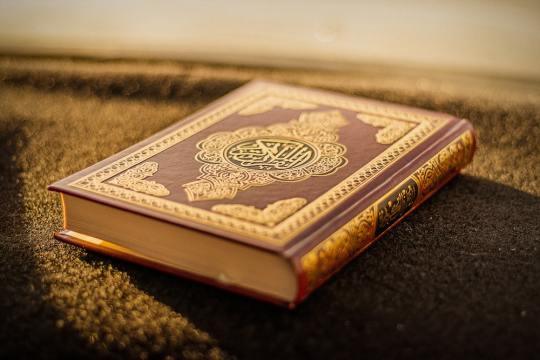
Surah Al-Qasas: The 28th chapter of the Holy Quran
Welcome to our blog post on Surah Al-Qasas, the 28th chapter of the Holy Quran! In this captivating journey through divine wisdom, we delve into a chapter that not only tells mesmerizing stories but also imparts profound life lessons. From Moses' miraculous escape from Pharaoh's clutches to the unforgettable encounter between Musa and Khidr, Surah Al-Qasas is an enchanting exploration of faith, resilience, and the boundless mercy of Allah. Join us as we unravel its verses and unlock hidden treasures that will leave you inspired and in awe of the timeless beauty found within these sacred pages. So sit back, relax, and let us embark on this spiritual adventure together!
Benefits of Reciting Surah Qasas
Surah Qasas, the 28th chapter of the Holy Quran, is a powerful and significant surah that holds many benefits for those who recite it. This surah encompasses a variety of themes and lessons, making it relevant to our lives in various ways. From stories of past prophets to guidance on how to deal with life's difficulties, Surah Qasas offers a wealth of wisdom and blessings for believers.
Here are some key benefits that can be attained through reciting Surah Qasas:
1. Strengthens Faith:
One of the most significant benefits of reciting Surah Qasas is that it strengthens one's faith and belief in Allah (SWT). Through this surah, we learn about the power and mercy of Allah (SWT) through His divine intervention in the lives of His prophets. The stories mentioned in this surah serve as reminders that no matter how difficult our circumstances may seem, Allah (SWT) has a plan for us and will guide us through our trials just as He did for those before us.
2. Guidance during Difficult Times:
Surah Qasas contains many stories of struggle and hardship faced by past prophets such as Musa (AS), Yusuf (AS), and Harun (AS). These narratives offer valuable lessons on how to deal with challenging situations with patience, reliance on Allah (SWT), and trust in His plans. Reciting this surah during times of difficulty can provide comfort and strengthen our
Surah Al-Qasas English Translation and Transliteration
Surah Al-Qasas is the 28th chapter of the Holy Quran, and it is a beautifully crafted surah that holds great significance in Islam. The name "Al-Qasas" translates to "The Narrations", which refers to the numerous stories mentioned in this surah.
This surah is divided into 88 verses and was revealed in Mecca during the early stages of Prophet Muhammad's (peace be upon him) prophethood. It is believed that this surah was revealed as a response to the disbelievers who challenged Prophet Muhammad (peace be upon him) to bring forth miracles from Allah.
1. Purpose and Themes of Surah Al-Qasas:
The primary purpose of this surah is to provide guidance and strengthen the faith of believers by narrating stories from past prophets and their struggles against disbelief and oppression. It also serves as a reminder for mankind about the consequences of rejecting faith in Allah.
One of the main themes of Surah Al-Qasas is Tawheed (oneness of Allah). It emphasizes on how all prophets, including Moses, Abraham, Joseph, and others, preached tawheed among their people despite facing challenges and persecution.
Another important theme is taqwa (God-consciousness), which is repeatedly mentioned throughout the surah. The story of Prophet Moses serves as an example for believers to have trust in Allah's plans even when faced with difficulties.
Surah Al-Qasas Tafseer Ibn-Kathir
1. Surah Al-Qasas Tafseer Ibn-Kathir: Exploring the Stories of Prophet Musa and Fir'aun
Surah Al-Qasas, also known as "The Stories", is the 28th chapter of the Holy Quran. This surah contains 88 verses and is named after the numerous stories that are mentioned within it. One of the most famous stories in this surah is that of Prophet Musa (Moses) and Fir'aun (Pharaoh). In this section, we will delve into the tafseer (exegesis) of Surah Al-Qasas according to Ibn-Kathir.
1.1 Background
Before we dive into the tafseer of Surah Al-Qasas, it is important to understand its context. This surah was revealed in Mecca during a time when Muslims were facing persecution from their enemies. The disbelievers would often mock them for not having any significant historical figures or stories in their religion like other nations did.
Therefore, Allah revealed Surah Al-Qasas to not only comfort and strengthen the believers but also to show them that they do have great prophets and powerful stories in their religion.
1.2 The Story of Prophet Musa and Fir'aun
The majority of Surah Al-Qasas is dedicated to telling the story of Prophet Musa and Fir'aun. It begins with how Musa was saved by Allah's decree when he was
Surah Al-Qasas read at Quran4ever.com
Surah Al-Qasas, also known as "The Stories," is the twenty-eighth chapter of the Holy Quran. It is a Makkan surah, meaning it was revealed to Prophet Muhammad (peace be upon him) during his early years in Mecca. This surah consists of 88 verses and is named after the story of Prophet Musa (Moses), which is mentioned in detail.
At Quran4ever.com, we strive to provide our readers with authentic and comprehensive resources for understanding the Quran. That's why Surah Al-Qasas holds a special place on our website, as its significance and message are crucial for every Muslim.
The main theme of Surah Al-Qasas revolves around the concept of trials and tribulations that believers face in their lives. Through various stories from different prophets, Allah (SWT) teaches us valuable lessons about patience, trust in Him, and ultimate success through faith.
The surah begins with an introduction to Pharaoh's tyrannical rule over Egypt and how he oppressed the Children of Israel. We learn about Musa's birth and miraculous escape from Pharaoh's decree to kill all newborn boys among his people. The story continues with Musa growing up under Pharaoh's care until he kills an Egyptian man who was beating one of his brethren from Israel. This incident forces Musa to flee Egypt and seek refuge in Midian.
In Midian, Musa meets Prophet Shuaib (Jethro), marries
Summary
The 28th chapter of the Holy Quran, Surah Al-Qasas, is a beautifully written and powerful chapter that holds deep significance for Muslims all around the world. Composed of 88 verses, it was revealed in Mecca during the early years of Islam.
The name “Al-Qasas” translates to “The Stories”, and this chapter certainly lives up to its name by containing numerous stories of past prophets and their struggles. It also delves into themes such as faith, patience, and divine guidance.
One of the main themes of Surah Al-Qasas is that of trials and tribulations faced by prophets and believers alike. The story of Prophet Musa (Moses) is recounted in detail, highlighting his journey from being raised in Pharaoh’s palace to his eventual mission as a messenger of God. The story serves as an inspiration for believers to never lose hope and trust in Allah during times of hardship.
Another prominent theme in this chapter is that of divine guidance. Throughout history, Allah has sent messengers to guide humanity towards the right path. In Surah Al-Qasas, we see how these messengers were chosen by Allah to fulfill His purpose on earth. This serves as a reminder for us to seek guidance from Him through prayer and following His commandments.
Surah Al-Qasas also emphasizes the importance of having sincere faith in Allah alone. The story of Prophet Musa’s mother placing her baby son in a basket on the Nile River reflects
#verses 1 to 10 from surah al-qasas#surah al qasas verse 1 to 10#surah al qasas 1-10#surah al qasas ayat 1-10#quran ayat about sky#surah waqiah english translation#surah kafirun in english#surah al-qasas verse 1 to 10#surah baqarah transliteration#quranic#al quran#holy quran#quran#quran or hadiths#quranquotes
3 notes
·
View notes
Text
[Book Review] 🧕Muslim Women’s Participation in Professional, Social and Political Life (#3 Women’s Emancipation during the Prophet’s Lifetime)🧕
🧮 Score: 3.7/5.0
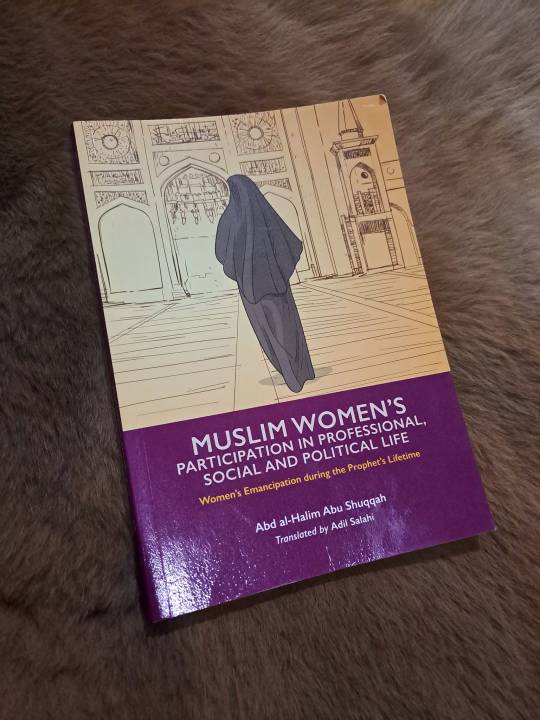
■ I think the most interesting portion of this volume would be in Chapter 3 -- in regards to women’s political participation. My “ranking” followed by Chapter 1, about women in professional sectors. As a so-called independent woman, these issues picked my interest because, contrary to some “orthodox Islamic belief systems” where a good muslimah must stay confined within their home and their movements should be restricted only to selected occasions and locations. Thus, this volume provides valid arguments and clarity to address these issues.
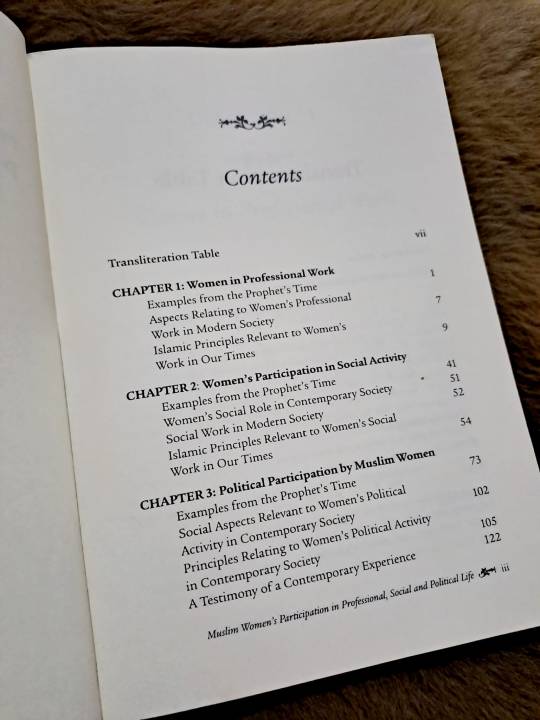
■ In the practical, reality of life, women deserve an education, and women deserve rights. After all, when Islam emerged during the Jahiliyyah period, it empowered women! Therefore, women's involvements in workforces and political scenes are a necessity for our ummah to strive successfully, biiznillah. After all, men and women are created to complement each other in running this earth, each of us has our fitrahs to contribute. That is why, to have a smoother society management on all levels, interactions and beneficial discussions among men and women being present in the same place, is inevitable. Of course, at the same, we must abide by the Islamic code of ethics. Islam is easy, there are guidelines for everything. People complicate matters.
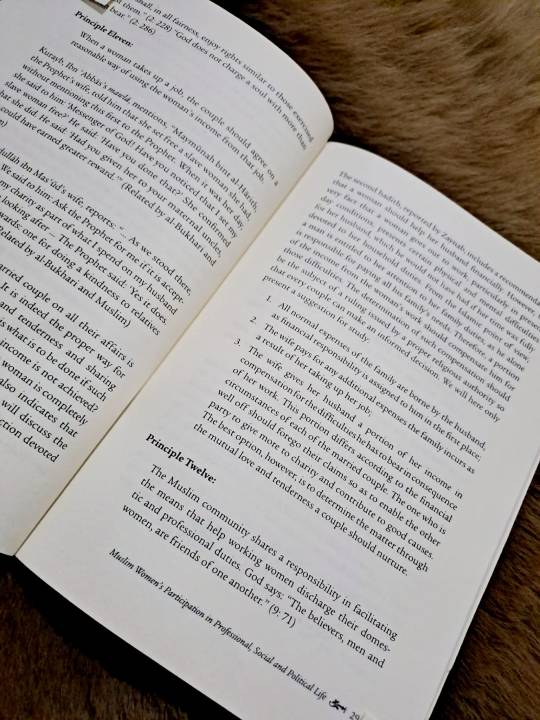

■ "Learn from history for a better future." As Muslims, we should always go back to the Quran and authentic hadiths. Then, the fatwas and other Kitabs by our verified, respectful scholars in Islam, in all fields. These sources provide solid and sound foundations and exemplary acts for us to refer to and get inspired. InshaAllah, with efforts and tawakkal, we will find solutions and uplift any oppressions. From this research, we will able to effectively strategise plans to be implemented in today’s issues. I highly appreciate the author’s and translator’s sincere efforts to educate and fix these centuries-old misconceptions. One of the few “pioneer” genres in the scene of English Islamic Books.

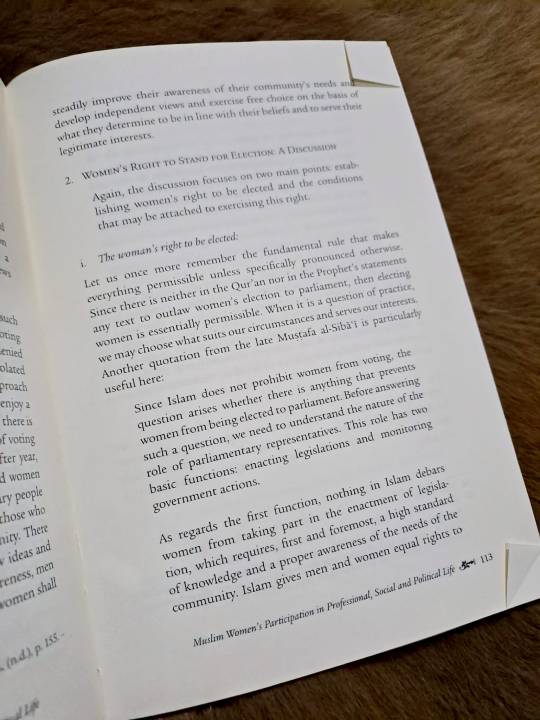
■ At the end of the day, the author is also a humble human, and he tried his level best. May Allah swt reward him abundantly for his intentions and good deeds. Having said that, within his content in this particular volume, here and there, there were times his explanations were a bit unclear or confusing. I am not sure whether it is due to linguistic issues due to cultural differences, or the meaning was lost in translation. Or, it was just me who failed to understand his words. Wallahualam.

■ Overall, this volume is recommended for casual readers and slow-paced students of knowledge to gain useful insights. It triggers critical thinking and is a good starting point before we delve into a more serious book. ---
Also read on other platforms:
Facebook
Instagram
--- 📍 Buy the book from Imanshoppe
---
Follow me on Telegram for quick updates!
#book review#hadith collection#islamic book#english translation#Arabic book#Kube Publishing#Adil Salahi#bibliophile#Women's emancipation during the Prophet's Lifetime#Muslim Women's Participation in Professional#Social and Political Life#Muslimah#students of knowledge#Abd al Halim Abu Shuqqah
1 note
·
View note
Text
Allāhumma bika aṣbaḥnā wa bika amsaynā wa bika naḥyā wa bika namūtu wa ilayka-l-maṣīr.
O Allah, by You we have entered the morning and by You we enter upon the evening. By You, we live and we die, and to You is the resurrection/return.
Abū Hurayrah (raḍiy Allāhu ʿanhu) narrated that the Messenger of Allah ﷺ used to say [the above] when he would enter the evening.” (Al-Adab al-Mufrad 1199)
اللهم بك أصبحنا، وبك أمسينا، وبك نحيا، وبك نموت، وإليك المصير
#adhkar#remembrance#supplication#dua#hadith#Prophet of Allah#arabic#english#translation#transliteration#islam
17 notes
·
View notes
Text

عَنْ أَبِي هُرَيْرَةَ ـ رضى الله عنه ـ قَالَ: " مَا عَابَ النَّبِيُّ صلى الله عليه وسلم طَعَامًا قَطُّ، إِنِ اشْتَهَاهُ أَكَلَهُ، وَإِلاَّ تَرَكَهُ." صحيح البخاري ومسلم حديث ٣٥٦٣ - ٢٠٦٤
Narrated Abu Huraira: " The Prophet (peace be upon him) never criticized any food (presented him), but he would eat it if he liked it; otherwise, he would leave it (without expressing his dislike). " Sahih al-Bukhari 3563 In-book reference : Book 61, Hadith 73 // Sahih Muslim 2064a In-book reference : Book 36, Hadith 254
ما عاب رسول الله - صلى الله عليه وسلم - طعامًا قط؛ أي: طعامًا مباحًا, أما الحرام، فكان يَعيبه ويذمه، وينهى عنه، وذهب بعضهم إلى أن العيب إن كان من جهة الخلقة، كُرِه، وإن كان من جهة الصَّنعة، لم يكره؛ لأن صنعة الله لا تُعاب، وصنعة الآدميين تعاب؛ قال الحافظ: والذي يظهر التعميم, فإن فيه كسر قلب الصانع؛ قال النووي: من آداب الطعام المتأكد�� ألا يعاب, كقوله: مالح, حامض, قليل الملح, غليظ, رقيق, غير ناضج, ونحو ذلك.
((وإن كرهه، ترَكه))؛ قال ابن بطال: هذا من حسن الأدب؛ لأن المرء قد لا يشتهي الشيء ويشتهيه غيره، وكل مأذون في أكله من قِبَل الشرع، ليس فيه عيبٌ. الشرح
The Prophet never spoke badly of any food served to him. Rather, if he liked it, he would eat it, if not, he would leave it, not belittling it. Hadith Translation/ Explanation : English French Urdu Indonesian Bosnian Russian Chinese Persian Indian Kurdish Portuguese Hausa Sinhalese: https://hadeethenc.com/en/browse/hadith/4966
#حديث#أحاديث نبوية#اللهم صل وسلم على نبينا محمد#محمد صلى الله عليه وسلم#hadith#صلى الله عليه وسلم#النبي محمد صلى الله عليه و آله وسلم#الرسول صلى الله عليه وسلم#رسول الله صلى الله عليه وسلم#طعام#اكل#الأكل#الطعام#عاب#عيب#��زق#حديث الرسول#sunnah#islam#ahadeth#hadeth#muslim#hadith sahih#prophet muhammad#prophet mohammed#prophet muhammed pbuh#islamic#islamdaily#welcome to islam#food
56 notes
·
View notes
Note
non-muslim #1 here,
hi yes I understand men take on most of the labor in Islam. my original question was not about labor. it was about the social stigma, trauma, debilitating guilt, gender-based violence (I could go on) that is constantly hanging over the heads of each and every muslim woman. women are perfectly capable of doing all those things you listed as ordained for men. maybe not in many Islamic countries, because again, women are seen as incapable and an embarrassment to her family if she were to take on the leading role in her family. women absolutely can and HAVE fought in wars, but your books have never recorded that, purposely. if you CHOOSE to look at science, men and women both have about the same amount of sexual desire. the only difference is one is accommodated and the other is approached with disgust. I always think of the hadith explaining that there are more women than men in Jahanem. this has never made any sense to me considering the fact that historically, it is men who are starting wars, genocides, corrupting governments, partaking in sexual violence and also just violence of any kind. whether it be towards fellow men or innocent children. what other explanation do you have for that besides a deep, subconscious disdain for women? especially considering the Islamic “roles” women have are mostly taken up in the house, why is it so much “easier” for women to go to hell?
I also would like the other non-muslim anon to know: I have read the Quran in full and I find it’s English-translation teachings to be beautiful. my advice to you is to deep-dive into the original Arabic and you will find the non-arabic words that majority of muslims are reading are not at all similar to the original intent and meanings of the Arabic Quran. I understand the west loves to construe Islam and paint it badly. although I have certain qualms about the religion, I still do not at all agree with the western portrayal of Islam and will never stand for Islamophobia.
If you say that you do not stand with Islamophobia, but most of what you mentioned from the points are the same ideas that are said by them
All the things that you mentioned that Muslim women are exposed to are a Western view that is incorrect and does not exist at all, but it occurs from Western thinking that wants women to transform into the Western style
But there is something that you should know, which is the complete difference between the Islamic view and the Western view of women. Islam has established a system for women that suits their physical and psychological nature,
There is no view of embarrassment for women, and you can read about the extent of attention and appreciation that the mother receives in Islam, for example, because this is her required role that suits her
I do not want to argue about certain matters such as the issue of desire, but the truth is that science and reality confirm that desire in men is much higher than in women. This is something that goes back to hormones, so it is a certain matter
And women participated in wars and it happened by force, and thus they were exposed to very difficult matters such as what happened in World War II. You can read that when she participated in the war, it led to a huge number of rapes because it was not her role, even if it was required of her - according to the Islamic view - and I think this difference is in the way of thinking that she was raised on, which does not These matters are taken into consideration, so many women in the West feel lost and depressed even though they have a job, money and other material things. In my opinion, this goes back to the most important point of difference, that the system that makes her do things exactly like a man is something that does not suit her and puts her under pressures that do not agree with her feelings and tolerance, and this is what Islam takes into consideration.
9 notes
·
View notes
Text
JAMI'at-TIRMIDHI: The Book on Vows and Oaths: Hadith 1943
Narrated 'Uqbah bin 'Amir:
"I said: 'O Messenger of Allah! My sister vowed that she would walk to the House barefoot and without Khimar (covering).' The Prophet (ﷺ) said: 'Verily Allah will not do anything with the misery of your sister. She should ride, and cover, and fast three days.'"
Reference : Jami` at-Tirmidhi 1544
In-book reference : Book 20, Hadith 23
English translation : Vol. 3, Book 20, Hadith 1544
#allah#muslim#convert#revert islam#revert help#converthelp#muslimah#reverthelp#hijab#new muslim#new convert#how to convert to islam#convert to islam#welcome to islam#god#islam#quran#revert#convert islam#revert help team#help#islamhelp#prayer#salah#reminder#pray#dua#muhammed#new revert
7 notes
·
View notes
Text
The Month of Rajab
From Quran إِنَّ عِدَّةَ ٱلشُّهُورِ عِندَ ٱللَّهِ ٱثْنَا عَشَرَ شَهْرًا فِى كِتَـٰبِ ٱللَّهِ يَوْمَ خَلَقَ ٱلسَّمَـٰوَٰتِ وَٱلْأَرْضَ مِنْهَآ أَرْبَعَةٌ حُرُمٌ ۚ ذَٰلِكَ ٱلدِّينُ ٱلْقَيِّمُ ۚ فَلَا تَظْلِمُوا۟ فِيهِنَّ أَنفُسَكُمْ التوبة/36 . Verily, the number of months with Allâh is twelve months (in a year), so was it ordained by Allâh on the Day when He created the heavens and the earth; of them four are Sacred (i.e. the 1st, the 7th, the 11th and the 12th months of the Islâmic calendar). That is the right religion, so wrong not yourselves therein. At-Tawbah 9:36 Hadith: Arabic Text followed by English Translation. عن أبي بكرة ، عن النبي صلى الله عليه وسلم ، قال : الزمان قد استدار كهيئة يوم خلق السموات والأرض ، السنة اثنا عشر شهرا منها أربعة حرم : ثلاثة متواليات : ذو القعدة ، وذو الحجة ، والمحرم ، ورجب مضر ، الذي بين جمادى وشعبان رواه البخاري ٤٤٠٦ و مسلم ١٦٧٩ Narrated Abu Bakrah: That the Messenger of Allah (ﷺ) said: Time has returned to its original order as it was on the day when Allah created the heavens and the earth. The year is twelve months, of which four are sacred: three consecutive months, Dhu’l-Qa‘dah, Dhu’l-Hijjah and Muharram, and Rajab of Mudar, which comes between Jumaada and Sha‘baan. Narrated by Al-Bukhari, 4406 and Muslim, 1679
4 notes
·
View notes
Text
Wealth Is In Being Content
Abu Hurayra reported that the Prophet, may Allah bless him and grant him peace, said, "Wealth does not mean having a lot of property, rather wealth is in being content."
Grade: Sahih (Al-Albani)
Al-Adab Al-Mufrad
English Translation : Book 14, Hadith 276
53 notes
·
View notes
Text
The Messenger of Allah ﷺ said,
“Whoever believes in Allah and the Last Day, let him speak good or remain silent”
Every human being is born with a pre-destined ‘word-count’. Just as our provisions, our actions, our lifespan, and our fate in the hereafter are written, so too is the number of words we utter above the ground.
Allāh says in the Qur’ān:
مَّا يَلْفِظُ مِن قَوْلٍ إِلَّا لَدَيْهِ رَقِيبٌ عَتِيدٌ
“Man does not utter a single word without an observer.”
(Al-Qur’ān, 50:18)
Words by their nature, can have contrasting effects. They can be memorable but also forgotten, they can enact change but also have no influence, and they can be a cause for a person’s eternal salvation but also their eternal damnation.
The Prophet (sall Allāhu ʿalayhi wa sallam) said:
“A person utters a word thoughtlessly (i.e. without thinking about it being good or not) and, as a result of this, he will fall down into the fire of Hell deeper than the distance between the east and the west.”
(Bukhāri and Muslim)
Imam Nawawi elaborates:
“Every legally responsible person should refrain from saying anything except when there is a clear advantage to speaking. Whenever speaking and not speaking are of equal benefit, it is sunnah to remain silent, for permissible speech easily leads to that which is unlawful or offensive, as actually happens much or even most of the time — and there is no substitute for safety.”
Take the advice of our Prophet (sall Allāhu ʿalayhi wa sallam):
مَنْ صَمَتَ نَجَا
“Whoever is silent is saved.”
(Al-Tirmidhi)
Silence can save a person from slander, gossip, lying, backbiting, and swearing among other sins. Once the tongue utters the word, and those in your surroundings have been harmed, then begins the begging of forgiveness and feeling of regret.
3 notes
·
View notes
Text
"اللَّهُمَّ إِنِّي أَسْأَلُكَ بِأَنِّي أَشْهَدُ أَنَّكَ أَنْتَ اللَّهُ لاَ إِلَهَ إِلاَّ أَنْتَ الأَحَدُ الصَّمَدُ الَّذِي لَمْ يَلِدْ وَلَمْ يُولَدْ وَلَمْ يَكُنْ لَهُ كُفُوًا أَحَدٌ."
Abdullah bin Buraidah Al Aslami narrated from his father, who said:
“The Prophet (ﷺ) heard a man supplicating, and he was saying: ‘O Allah, indeed, I ask you by my testifying that You are Allah, there is none worthy of worship except You, the One, As-Samad, the one who does not beget, nor was begotten, and there is none who is like Him (Allāhumma innī as’aluka bi annī ashhadu annaka antallāh, lā ilāha illā ant, al-aḥaduṣ-ṣamad, alladhī lam yalid wa lam yūlad, wa lam yakun lahu kufuwan aḥad).” He said: “So he said: ‘By the One in Whose Hand is my soul, he has asked Allah by His Greatest Name, the one which if He is called upon by it, He responds, and when He is asked by it, He gives.’
Grade: Sahih (Darussalam), Reference : Jami` at-Tirmidhi 3475, In-book reference : Book 48, Hadith 106, English translation : Vol. 6, Book 45, Hadith 3475
9 notes
·
View notes
Text
“The Messenger of Allah (ﷺ) said: ‘Whoever wakes up in the morning and says upon waking
سُبْحَانَ اللَّهِ وَالْحَمْدُ لِلَّهِ وَلاَ إِلَهَ إِلاَّ اللَّهُ وَاللَّهُ أَكْبَرُ وَلاَ حَوْلَ وَلاَ قُوَّةَ إِلاَّ بِاللَّهِ الْعَلِيِّ الْعَظِيمِ
La ilaha illallah wahdahu la sharika lahu, lahul-mulku wa lahul-hamdu, wa Huwa ‘ala kulli shay’in Qadir; Subhan-Allah walhamdu lillahi, wa la ilaha illallahu, wa Allahu Akbar, wa la hawla wa la quwwata illa billahil-‘Aliyil-‘Azim
(None has the right to be worshipped but Allah alone, with no partner or associate. His is the dominion and all praise is to Him, and He is Able to do all things. Glory is to Allah, praise is to Allah, none has the right to be worshiped but Allah, Allah is the Most Great, and there is no power and no strength except with Allah, the Most High, the Most Supreme),
then he supplicates Rabbighfirli (O Lord, forgive me), he will be forgiven.’”
Walid said: “Or he said: then if he supplicated, it will be answered for him then if he stood up and performed ablution and then performed prayer, his prayer would be accepted.”
Grade: Sahih (Darussalam)
Reference : Sunan Ibn Majah 3878
In-book reference : Book 34, Hadith 52
English translation : Vol. 5, Book 34, Hadith 3878
#islam reminder#islam#muslim#islamic quotes#islamic reminders#islamic#islamicreminder#daughters in islam
28 notes
·
View notes
Text
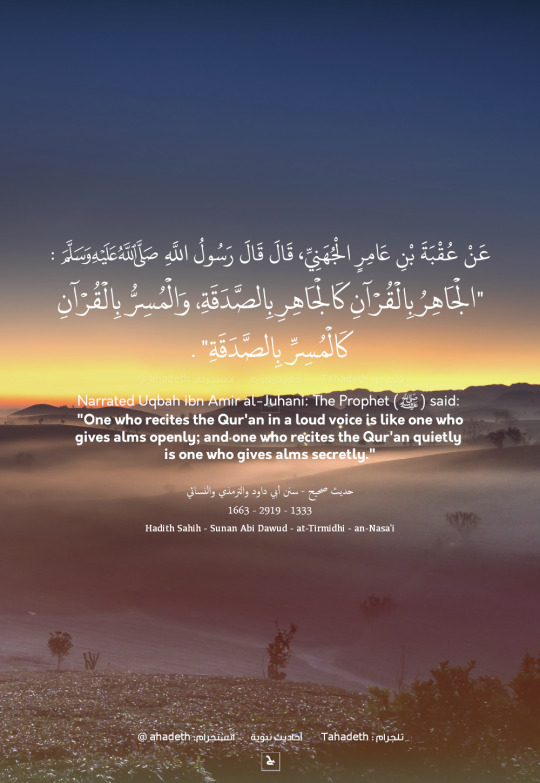
عَنْ عُقْبَةَ بْنِ عَامِرٍ الْجُهَنِيِّ، قَالَ قَالَ رَسُولُ اللَّهِ صلى الله عليه وسلم : " الْجَاهِرُ بِالْقُرْآنِ كَالْجَاهِرِ بِالصَّدَقَةِ، وَالْمُسِرُّ بِالْقُرْآنِ كَالْمُسِرِّ بِالصَّدَقَةِ " . حديث صحيح - سنن أبي داود ١٣٣٣ - والترمذي ٢٩١٩- والنسائي ١٦٦٣
Narrated Uqbah ibn Amir al-Juhani: The Prophet (ﷺ) said: "One who recites the Qur'an in a loud voice is like one who gives alms openly; and one who recites the Qur'an quietly is one who gives alms secretly." Hadith Sahih - Sunan Abi Dawud 1333 In-book reference : Book 5, Hadith 84 | Jami` at-Tirmidhi 2919 In-book reference : Book 45, Hadith 45 | Sunan an-Nasa'i 2561 In-book reference : Book 23, Hadith 127
قال الترمذي: وَمَعْنَى هَذَا الْحَدِيثِ أَنَّ الَّذِي يُسِرُّ بِقِرَاءَةِ الْقُرْآنِ أَفْضَلُ مِنَ الَّذِي يَجْهَرُ بِقِرَاءَةِ الْقُرْآنِ لأَنَّ صَدَقَةَ السِّرِّ أَفْضَلُ عِنْدَ أَهْلِ الْعِلْمِ مِنْ صَدَقَةِ الْعَلاَنِيَةِ وَإِنَّمَا مَعْنَى هَذَا عِنْدَ أَهْلِ الْعِلْمِ لِكَىْ يَأْمَنَ الرَّجُلُ مِنَ الْعُجُبِ لأَنَّ الَّذِي يُسِرُّ الْعَمَلَ لاَ يُخَافُ عَلَيْهِ الْعُجْبُ مَا يُخَافُ عَلَيْهِ مِنْ عَلاَنِيَتِهِ . جامع الترمذي
العِباداتُ كلُّها يَنبَغي أن تَكونَ خالِصةً لوجهِ اللهِ، ولا يُطلَبَ بها الرِّياءُ ولا السُّمعةُ ولا التَّفاخرُ بينَ النَّاسِ؛ لأنَّ اللهَ غنيٌّ عن كلِّ ذلك، وإنَّما يَقبَلُ مِن تلك العباداتِ ما كان خالِصًا لوجهِه سبحانَه. وفي هذا الحديثِ يَقولُ النَّبيُّ صلَّى اللهُ علَيْه وسلَّم: "الجاهرُ بالقرآنِ"، أي: الَّذي يَرفَعُ صوتَه بالقرآنِ في القِراءةِ، وخاصَّة أمامَ النَّاسِ؛ "كالجاهرِ بالصَّدقةِ"، أي: مِثلُ المُجاهِرِ المُعلِنِ لصَدقتِه أمامَ النَّاسِ "والمُسِرُّ بالقرآنِ كالمُسِرِّ بالصَّدقةِ"، أي: مَن يقرَأُ في سِرِّه ويتَدبَّرُ بعَقلِه مِثل الَّذي يُخفِي صَدَقتَه عن أعيُنِ النَّاسِ، والإسرارُ أفضلُ في حَقِّ مَن يَخافُ الرِّياءَ؛ لأنَّ الإسرارَ أبعدُ عن الرِّياءِ؛ فإنْ لم يَخَفْ، فالجهرُ أفضلُ بشَرْط ألَّا يُؤذِي غيرَه ولا يتأذَّى بقِراءتِه أحدٌ كمُصلٍّ أو نائمٍ أو غيرِهما، والعملُ في الجَهرِ أكثرُ، ويَتعدَّى نفْعُه إلى غيرِ القارئِ؛ ويُوقِظُ قلبَ القارِئ، ويَجمَع همَّه إلى الفِكر، ويصرِفُ سمْعَه إليه؛ ويطرُد النومَ، ويزيدُ في النشاط؛ فمتَى حضَره شيءٌ من هذه النِّيات؛ فالجهرُ أفضلُ؛ فإذا كان الجهرُ يترتَّبُ عليه مصلحةٌ، فهذا الجهرِ أوْلَى، وإذا لم يَكُن في الجَهرِ مَصلحةٌ فالإسرارُ أَوْلَى، فهذا أفضلُ مِن هذه الناحيةِ. وقيل: ما كان فيه التدبرُ أتمَّ فهو الأفضلُ. وفي الحديثِ: مدْحُ الإسرارِ بالعِباداتِ معَ إخلاصِها للهِ. وفيه: بيانُ أنَّه لا أجْرَ لِمَن يُرائِي بعِلْمه وقِراءَتِه. الدرر السنية
Reciting the Qur’an secretly is better, just as giving charity secretly is better, for the sincerity involved and the avoidance of show-off and self-admiration, unless if openness is required for some need or benefit, like teaching the Qur’an to others. Hadith Translation/ Explanation : English Urdu Spanish Indonesian Uyghur Bengali French Turkish Bosnian Sinhalese Indian Vietnamese Tagalog Kurdish Hausa Portuguese Malayalam Telgu Swahili Tamil Burmese Thai German Pashto Assamese Albanian Swedish Amharic Dutch Gujarati Kyrgyz Nepali Yoruba Lithuanian Dari Serbian Somali Tajik Kinyarwanda Romanian Hungarian Czech Malagasy Italian Oromo Kannada Azeri Uzbek Ukrainian: https://hadeethenc.com/en/browse/hadith/65055
#حديث#أحاديث نبوية#الرسول صلى الله عليه وسلم#رسول الله صلى الله عليه وسلم#صلى الله عليه وسلم#النبي محمد صلى الله عليه و آله وسلم#محمد صلى الله عليه وسلم#اللهم صل وسلم على نبينا محمد#تلاوة#قيام الليل#القرآن الكريم#قراءة القرآن#تدبر القرآن#تلاوة القرآن#سر#جهر#الصدقة#صدقة#hadith#ahadeth#hadeth#hadith sahih#sunnah#islam#muslim#prophet muhammad#sunna#hadiths#quran#quran recitation
40 notes
·
View notes
Text
JAMI'at-TIRMIDHI: The Book on Military Expeditions: Hadith 1960
Narrated Abu Tha'labah Al-Khushani:
"The Messenger of Allah (ﷺ) was asked about the pots of the Zorastrians. He said: 'Clean them by washing them, and then cook in them.' And he prohibited every predator and possessor of canines."
This Hadith has been reported through routes other than this from Abu Tha'labah. Abu Idris Al-Khawlani reported it from Abu Tha'labah. Abu Qilabah did not hear from Abu Tha'labah, he only reported it from Abu Asma', from Abu Tha'labah.
Reference : Jami` at-Tirmidhi 1560
In-book reference : Book 21, Hadith 15
English translation : Vol. 3, Book 19, Hadith 1560
#allah#muslim#convert#revert islam#revert help#converthelp#muslimah#reverthelp#hijab#new muslim#new convert#how to convert to islam#convert to islam#welcome to islam#god#islam#quran#revert#convert islam#revert help team#help#islamhelp#prayer#salah#reminder#pray#dua#muhammed#new revert
4 notes
·
View notes
Text
Shariq al-Hawzani and I came to Aisha (Allah be pleased with her) and asked her: By which (prayer) the Messenger of Allah (ﷺ) began when he woke up at night? She replied: You asked me about a thing which no one asked me before. When he woke up at night, he uttered: "Allah is Most Great" ten times, and uttered "Praise be to Allah" ten times, and said "Glory be to Allah and I begin with His praise" ten times, and said: "Glory be to the King, the Most Holy" ten times, and asked Allah's pardon ten times, and said: "There is no god but Allah" ten times, and then said: "O Allah! I seek refuge in Thee from the strait of the Day of resurrection," ten times. He then began the prayer.
حَدَّثَنَا كَثِيرُ بْنُ عُبَيْدٍ، حَدَّثَنَا بَقِيَّةُ بْنُ الْوَلِيدِ، عَنْ عُمَرَ بْنِ جُعْثُمٍ، قَالَ حَدَّثَنِي الأَزْهَرُ بْنُ عَبْدِ اللَّهِ الْحَرَازِيُّ، قَالَ حَدَّثَنِي شَرِيقٌ الْهَوْزَنِيُّ، قَالَ دَخَلْتُ عَلَى عَائِشَةَ رضى الله عنها فَسَأَلْتُهَا بِمَ كَانَ رَسُولُ اللَّهِ صلى الله عليه وسلم يَفْتَتِحُ إِذَا هَبَّ مِنَ اللَّيْلِ فَقَالَتْ لَقَدْ سَأَلْتَنِي عَنْ شَىْءٍ مَا سَأَلَنِي عَنْهُ أَحَدٌ قَبْلَكَ كَانَ إِذَا هَبَّ مِنَ اللَّيْلِ كَبَّرَ عَشْرًا وَحَمِدَ عَشْرًا وَقَالَ " سُبْحَانَ اللَّهِ وَبِحَمْدِهِ " . عَشْرًا وَقَالَ " سُبْحَانَ الْمَلِكِ الْقُدُّوسِ " . عَشْرًا وَاسْتَغْفَرَ عَشْرًا وَهَلَّلَ عَشْرًا ثُمَّ قَالَ " اللَّهُمَّ إِنِّي أَعُوذُ بِكَ مِنْ ضِيقِ الدُّنْيَا وَضِيقِ يَوْمِ الْقِيَامَةِ " . عَشْرًا ثُمَّ يَفْتَتِحُ الصَّلاَةَ .
Grade: Hasan Sahih (Al-Albani)
Reference : Sunan Abi Dawud 5085
In-book reference : Book 43, Hadith 313
English translation : Book 42, Hadith 5066
6 notes
·
View notes